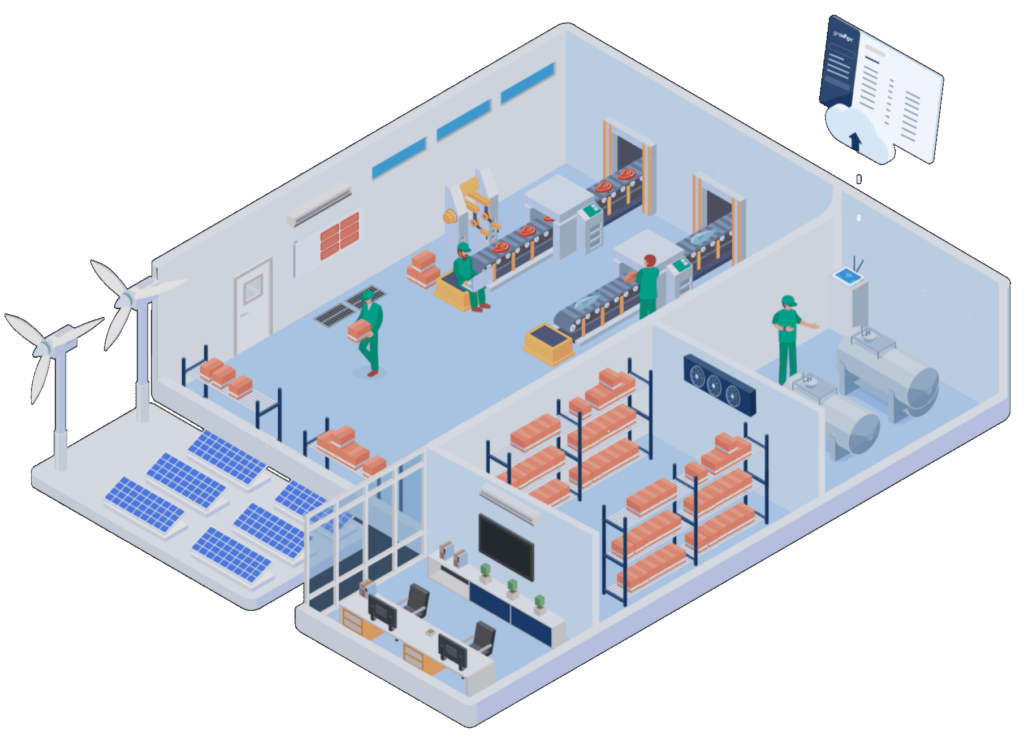Gradhoc
Quality control in Food Industry. Cooling Technology
Smart refrigeration, cooler future
Request a demo or a quote
Request a demo adapted to your specific needs, with a focus on quality in food industry
Gradhoc
SMART Technology to Optimize Your HACCP Management and Enhance Food Safety
Quality departments in the food industry face significant challenges, including losses caused by inefficient refrigeration system management and the excessive time required to gather and process data for reports and plans such as HACCP (Hazard Analysis and Critical Control Points) management.
Implementing software that enhances food safety is a critical step towards the digital transformation of this key departmental area.
The innovative Smart Cooling platform offers:

Concerns of Quality Managers: |
|---|
Risk of losses and waste due to inefficient management of refrigeration systems. |
Absence of continuous real-time monitoring and fragmented information, hindering the acquisition of accurate and ongoing temperature data. |
Excessive time spent on data collection and processing for reports and plans (such as HACCP). |
Risk of deviations in the control of Critical Control Points (CCPs), jeopardizing food safety, especially in the absence of continuous real-time monitoring. |
Lack of predictive capabilities to anticipate refrigeration system issues before they occur, preventing corrective measures. |
Complexity in generating precise documentation required for audits and regulatory compliance. |
Dependence on other departments: production and maintenance. |
Gradhoc
With Gradhoc, you enhance quality control in the food industry
Gradhoc is a cloud-based software solution specifically designed for the agri-food industry, aimed at optimizing refrigeration processes and ensuring the seamless operation of critical facilities. For quality and food safety managers, Gradhoc serves as a strategic tool to safeguard product integrity, mitigate risks, and maintain high operational standards.
By integrating technologies like IoT, artificial intelligence, and digital twins, Gradhoc continuously monitors refrigeration systems, predicts potential failures, and performs automated corrective actions before issues arise. This proactive approach ensures that products remain in optimal storage conditions, reducing the risk of regulatory non-compliance and maintaining food safety standards.
Additionally, Gradhoc provides real-time monitoring and advanced energy management tools, enabling quality managers to identify system inefficiencies and ensure compliance with quality and sustainability regulations. Its predictive maintenance capabilities not only prevent failures but also ensure efficient operations, minimizing disruptions that could compromise the cold chain and, consequently, food quality.
In a sector where food safety and operational excellence are paramount, Gradhoc offers peace of mind by ensuring refrigeration systems perform at their best, protecting product quality and reinforcing consumer trust.
With Gradhoc, you not only address the challenges faced by Quality Managers as outlined above, but you also contribute to achieving the objectives of other departments within the organization. Align your goals and foster strategic collaboration with your fellow managers!
Concerns from other areas of the Organization | Maintenance | Sustainability | IT | Production | Finance | R&D | |
|---|---|---|---|---|---|---|---|
Reactive system management: reliance on corrective maintenance. | |||||||
Excessive on-site manual interventions. | |||||||
Reduced equipment and machinery lifespan. | |||||||
High costs: energy and maintenance expenses. | |||||||
Challenges in ensuring food safety. | |||||||
Regulatory compliance: food safety, energy reduction, and food waste minimization. | |||||||
Product losses and food waste. | |||||||
Production downtime. | |||||||
Data management issues: absence of data or inconsistent data streams. | |||||||
Heterogeneous information from different manufacturers and sources. | |||||||
Deployment of monolithic solutions with limited integration capability. | |||||||
Disaggregated information across various refrigeration subsystems. | |||||||
Specialized maintenance requiring dedicated personnel. | |||||||
Excessive personnel involvement in operational tasks. | |||||||
Employee stress: unplanned tasks, emergencies, or production halts. | |||||||
Legacy technologies with limited traceability in processes. |
Gradhoc
Enhancing Quality Assurance in the Food Industry: The Role of Quality Control
The quality department plays a pivotal role in ensuring that products meet safety, regulatory, and consumer expectations. By implementing robust quality control measures, businesses can safeguard their reputation, enhance operational efficiency, and build lasting trust with their customers.
Quality assurance in the food industry encompasses a comprehensive approach to maintaining consistency, safety, and compliance throughout the production process. From sourcing raw materials to final product delivery, each stage demands meticulous attention to detail. This ensures not only compliance with global food safety regulations such as HACCP and ISO 22000 but also fosters consumer confidence in the brand.
In today’s digital age, technology offers advanced solutions for quality control. Automated monitoring systems, data analytics, and IoT-enabled devices allow for real-time tracking of critical parameters, minimizing human error and enabling predictive maintenance. Such innovations not only improve operational efficiency but also provide actionable insights for continuous improvement.
As consumer expectations and regulatory demands evolve, the need for stringent quality assurance in the food industry has never been greater. Companies that prioritize their quality department and invest in advanced quality control systems position themselves as leaders in delivering safe, high-quality products. This commitment to excellence is essential for long-term success in a competitive and dynamic market.
In the future, quality control promises even greater emphasis on automation, real-time monitoring, and data-driven decision-making. Advanced technologies, such as artificial intelligence and machine learning, are set to revolutionize the way the quality department functions, making quality assurance processes more efficient and effective.
Gradhoc
Will you prepare for change?
Fill out the form to request a demo or a quote